
“Guide me, O thou great Redeemer,
Pilgrim through this barren land;
I am weak, but thou art mighty;
Hold me with thy powerful hand:
Bread of heaven, bread of heaven
Feed me now and evermore...

Pan yn troedio glan Iorddonen,
Par i'm hofnau suddo i gyd;
Dwg fi drwy y tonnau geirwon
Draw i Ganaan -- gartref clyd:
Mawl diderfyn. Mawl diderfyn
Fydd i'th enw byth am hyn."
~ William Williams, Cwm Rhondda.
Through recent weeks, I’ve made many notes on the topic of looking forward. While negotiating dark valleys and clambering the barricaded roads of this season, it’s been a transformative experience. But it is a season of undetermined duration. Consistent with this aspect, there are no tidy and packaged conclusions. The whole of life as pilgrimage voyage, composed of travels and experiences, presents innumerable unknowns. All the more reason to be conscientiously grounded and sure-footed. Still, despite persistent adversities, hope must persevere. Looking ahead and motioning forward become all the more essential. Reaching forth demonstrates an outworking of hopefulness; it is the manifestation of trust. A writing exercise about the theme of awaiting has paralleled a portion of trying times. As always, the worthiness of articulating of thoughts matches that of the act of trust itself. Journeying without journaling is unimaginable.

Amidst grim landscape, hopelessness and pessimism must be uprooted; these objectives cannot take up space with essential personal effects. Experienced hikers and long-haul travellers can attest to the critical factors of bulk and capacity. Pilgrims (and vacationers alike) share the motivation of their circumstances in common. For me, to look ahead and to hope for better are longings fueled by past and present. While writing journal entries, I thought of many good people teaching me many good things through the years. As well and as it happens, the journal turned into a journalistic tool, and I asked friends about the value of looking forward. One said, “you have to. That’s what hope is.” Then my thoughts returned to awaiting, and whether it is healthful to live in a state of anticipation. I’ve met many whose faiths are fixated on an awaiting. Missing the present, it’s something of an “over yonder” brand of anticipation. By contrast, there is the sort of awaiting that impatiently looks at timepieces. What do you await? Trying at answering this myself began with hopes for blessings Divine and human. How about a goal, an object, for one’s hopes? Reaching forward through a murky immediate future, ends and means are as difficult to see as reasons for doing so. But the desire to look forward and proceed with one’s whole self is surely necessary; maybe even more so than to have a carrot at the end of a proverbial stick. Indeed, we are naturally oriented toward moving ahead. Consider how we are formed, facing forward. We are built to stride in a straight-ahead direction. (One person told me that turning around and going backward is too much work!) Consider how motion is tied to continuity and advancement.

Stilling my thoughts between tasks and blocks of time at work, I continued chipping away at answering the question about looking forward. At times, I chided myself for being so self-conscious, and at other times I wondered why I could not specify more than temporal task lists. Essentially, with an instinctive general wish for improvement all around, I’m drawn forward. Should forward movement always have specifics spelled out? There are more attainable objectives we tend to eagerly await, such as weekends, a special meal, visits, or making an acquisition. But do we anticipate continuity? Maybe so; it’s good to look forward to more journeys- even in these times. Even at such morning crossroads that cause one to ask whether the new day is another loss to futility, or is it a gainful opening for potentiality. Perhaps the plain, bare desire to look forward is sufficient. Daily in my prayers are the many imperiled people of Japan, who will be rebuilding portions of their country for a very long time. But they do so because they look forward, and they will continue to invest their energies into their lives and hopes. A great testament about looking ahead.

Determined that looking ahead is both worthwhile and clearly preferable, I’ll conclude these notes with a few thoughts. Journal pages, meant to be refuge from wearisome fragmentation, became laden themselves repeating themes. The best momentary thing to do was to write in a colorful venue, different enough to affect perspective. Unable to be exact, the deadlock seemed to be around specifically what to look forward to, not really why- or why it’s necessary. Often, my little stray notes would begin with: “what do you look forward to?” From there, I started to reason that I needn’t name an exact thing, but it was enough to eagerly look ahead to being, recognizing the corresponding motion as transcendent of circumstance, material, and frustration. Looking ahead, itself an action responding to grace, inclines the soul to embrace Divine providence. Words and concepts out of my grasp indicate hopes that- as yet- elude specificity. With the ancient Apostle Paul, who knew only to reach forward, we can reflect the vitality of prayer- even without detailed specifics. Perseverance aches for meaning, for communion, for an advent.

Very simply, I look forward to more learning and meaningfully-lived days. I’ll have to do more than persevere. It will take an indefatigable spirit of trust that can see above the appearances of circumstances and situations. It would all be feeble theory and idle talk, without practice and active application. To begin by looking ahead to increased grace launches from one consolation to another. Immediate and before me are proving-grounds for uncertainty to find the wellspring of certitude. A simple, open, and earnest willingness to living prayer is significant enough to be useful in the cause of bringing goodness to pass. Indeed, there is reassurance in the reminder that grace does not emanate from me, but is purposed to work through me as light through glass prisms.

So, once more, before I call it a night: What do I look forward to?
I look forward to better things, still, to more purpose to my steps and my days.
I look forward, because I am not compelled either to consider what I see now to be all there will ever be, and surely don’t think what is past is all that will ever be worthwhile.
I await and reach forward to better days.
I await and reach forward to better.
I await and reach forward.
I await and reach.
I await.




























